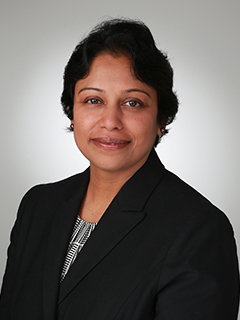2017 New Century Scholars Research Grant
Connecting the Dots With Hearing Loss and Cognition
 Raksha Mudar was well into her studies to become a speech-language pathologist when she had an epiphany. Her intent, she recalls, was always to work with children. Growing up in Bengalaru, India, her cousin received speech therapy and she saw what a difference it made for his outcome. But while in her undergraduate program, she had another personal encounter that changed her trajectory. A close family friend was diagnosed with Alzheimer’s dementia, and she saw how his family struggled to connect with him.
Raksha Mudar was well into her studies to become a speech-language pathologist when she had an epiphany. Her intent, she recalls, was always to work with children. Growing up in Bengalaru, India, her cousin received speech therapy and she saw what a difference it made for his outcome. But while in her undergraduate program, she had another personal encounter that changed her trajectory. A close family friend was diagnosed with Alzheimer’s dementia, and she saw how his family struggled to connect with him.
“This was a person I looked up to a great deal and he was the best storyteller,” she says. “It was so surprising to me how quickly he went downhill, and it was evident his family struggled to understand his needs and wishes. It was disheartening for me to watch his communication deteriorate. I kept wondering ‘Shouldn’t speech-language pathologists be helping these individuals? Why is he not getting any help?’”
And that set her on her path to learn more about the effects of normal aging and age-related conditions, including Alzheimer’s disease on cognitive-communication abilities. As we age, she explains, many factors contribute to decreased cognition and increased social isolation including hearing loss. Hearing loss is a very common condition in older adults. The New Century Scholars Research Grant she received in 2017 funded her study, “Cognitive and Neural Alterations in Age-Associated Hearing Loss,” where she and her team learned about some of those links. For example, they found noticeable differences in inhibitory control on behavioral and neurophysiological measures between individuals with mild untreated hearing loss and normal hearing peers. Additionally, preliminary MRI data showed gray matter alterations in the auditory and non-auditory regions of the brain in individuals with mild untreated hearing loss. These findings, she says, are important clues factors that impact aging and ultimately can be a step toward finding earlier interventions to support brain health in older adults and avoid negative outcomes.
“Understanding the effects of aging and age-related conditions are not just important to me, but it’s important to all of us,” Mudar says. “We are all living longer, so it’s important we learn how we can age in place with good quality of life. Aging is complex and there are so many changes that occur. We know interventions such as fitting hearing aids earlier in those with hearing loss could help maintain brain health.”
Receiving funding from the ASHFoundation was key to her starting this new line of research, she says. The study not only allowed Mudar to collect enough pilot data to submit applications to larger grants, which means larger studies, but it also allowed her to work with graduate and undergraduate students to help them learn more about research and, hopefully, continue the search for answers. Meanwhile, she is always keenly aware of why her pursuit for knowledge began in the first place.
“As a researcher, I never lose sight of the fact that we are trying to move the field forward and the people in our lives are our inspirations,” she says. “I’m deeply grateful to the ASHFoundation for this opportunity to continue to look for answers.”
View More Recipient Spotlights